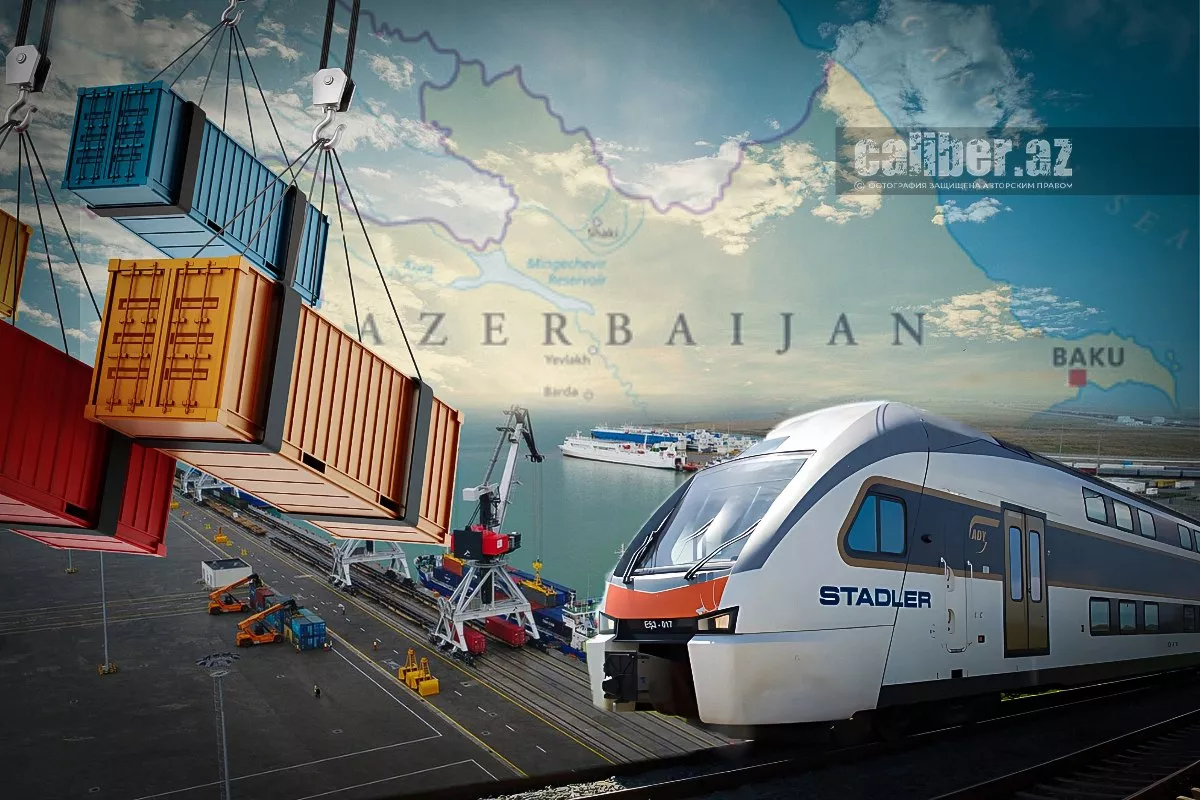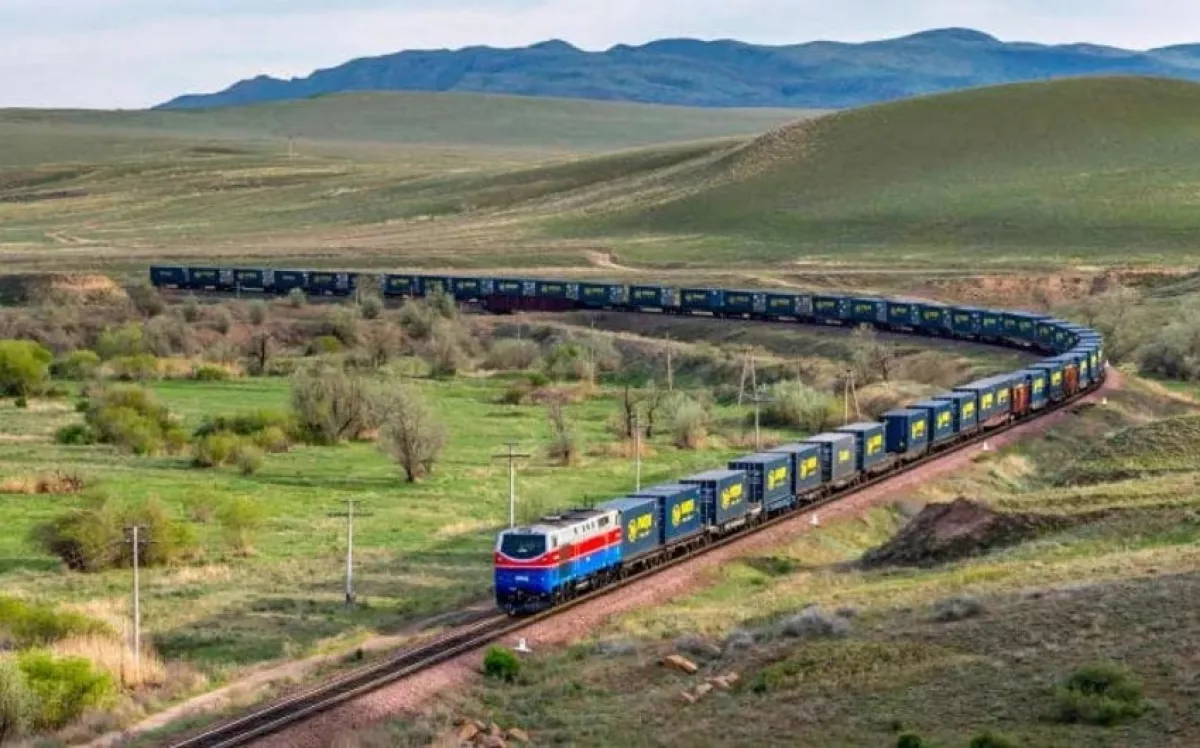Middle Corridor: Focus on tariff harmonisation and digital logistics Caliber.Az review
Azerbaijan, Türkiye, Georgia, and the Central Asian countries involved in developing the Middle Corridor have agreed to accelerate efforts to harmonise tariffs and eliminate “bottlenecks” along the Trans-Caspian International Transport Route (TITR). Key aspects of the corridor’s development—including increasing transit freight volumes along the Baku–Tbilisi–Kars (BTK) railway and strengthening transport and logistics connectivity—were discussed at the 7th International Transport & Logistics Business Forum: “New Silk Way” in Almaty, held as part of Kazakhstan’s Transport Week.
The main partners along the TITR—Baku, Astana, Ankara, and Tbilisi—have been implementing large-scale modernisation projects along the route for several years. The 2022–2027 Roadmap aims to synchronously remove bottlenecks and further develop the Middle Corridor. Under this plan, Kazakhstan’s Aktau maritime hub and Azerbaijan’s Alat container terminal are being upgraded, with container throughput expected to increase to over 300,000 units, and ultimately to 600,000 units in the longer term.
Meanwhile, the Georgian section of the Baku–Tbilisi–Kars railway, modernised last year, has seen its cargo capacity rise from 1 million to 5 million tonnes. Alat International Trade Port is also expanding, increasing its capacity from 15 million to 25 million tonnes, including the addition of a fertiliser terminal commissioned two years ago.
As a key hub of the Middle Corridor, Azerbaijan, together with the states on the eastern shore of the Caspian, is currently focusing not only on infrastructure modernisation but also on improving cross-border and customs procedures and digitalising logistics to expand the route’s capacity for East–West transit.
“Over the past three years, cargo shipments along the Middle Corridor through Azerbaijan have grown by approximately 90 per cent, while transit times have been significantly shortened. Projections indicate that by 2030, the freight capacity of the Middle Corridor will triple compared to 2021, with transit times expected to be cut in half,” emphasised President of Azerbaijan Ilham Aliyev in his address to participants at the recently held 6th Caspian Business Forum in New York.

Accordingly, the main task facing the countries participating in the TITR project today is to create favourable conditions for attracting the maximum possible volume of cargo to the Middle Corridor by optimising legislative and administrative mechanisms for freight forwarders and logistics operators. These and other issues were discussed recently during Transport Week in Kazakhstan, which featured the 7th International Transport & Logistics Business Forum: “New Silk Way” in Almaty.
The forum addressed topics such as corridor infrastructure development, the integration of ports and railways, technological modernisation, and the expansion of transit capacities. Additionally, the heads of the transport ministries of the four TITR countries signed a number of key agreements aimed at further developing the Middle Corridor.
According to the Ministry of Transport of Kazakhstan, the agreements reached during the forum are aimed at strengthening cooperation among the participating countries, ensuring uninterrupted transport operations, increasing transit capacity, and enhancing the competitiveness of the Middle Corridor on the international stage. The corridor is becoming an important element of sustainable regional development and global logistics chains.
Among the agreements, forum participants signed the “Action Plan for Eliminating Bottlenecks on the TITR,” which envisages coordinated measures by the railway administrations of Kazakhstan, Azerbaijan, and Georgia. They also concluded an agreement with the European Bank for Reconstruction and Development (EBRD) on financing port infrastructure and acquiring STS cranes for the Aktau International Sea Trade Port. In addition, Azerbaijan, Türkiye, and Georgia signed a Memorandum of Understanding on organising freight transportation via the Baku–Tbilisi–Kars railway line.
“The Memorandum of Understanding signed by the heads of the railway administrations of Azerbaijan, Türkiye, and Georgia at the New Silk Way forum outlines joint steps to develop the BTK route as a faster, more sustainable, and more competitive transport corridor. Our main goals are to establish a stable and predictable operational regime on the BTK, improve conditions for cargo owners, and increase freight volumes,” wrote Rovshan Rustamov, Chairman of JSC Azerbaijan Railways (ADY), on his Facebook page.
Speaking at the panel discussion “Development of Railway Infrastructure in the Eurasian Space,” Rustamov emphasised that the BTK “steel” corridor, as the main freight route connecting Azerbaijan, Georgia, and Türkiye, plays a key role in the regional transport system. According to him, the BTK, together with the prospective Zangezur corridor, will expand the region’s transit capacity, creating an integrated network to support steadily growing trade flows year by year.
In particular, the parties agreed to increase the competitiveness of the BTK route by establishing a stable and predictable operational regime and attracting additional freight flows. This includes optimised delivery times, competitive tariffs for freight operators, and the creation of a transparent pricing mechanism.
According to ADY, the trilateral agreement specifies that transit times (excluding customs and border procedures) along the Alat–Boyuk Kasik and Gardabani–Akhaltsikhe sections must not exceed 24 hours, and along the Yalama–Boyuk Kasik section — no more than 48 hours. In Türkiye, delivery times are limited to 60 hours on the Kars–Mersin section and 70 hours on the Kars–Istanbul section. As a result, cargo shipments from Alat to Mersin will take approximately 4.5 days. In cases of deviations from the standard delivery times, the parties will promptly inform each other and take measures to restore the schedule.
Freight tariffs along the BTK route will be determined based on mutual agreements, with plans to implement a unified long-term tariff across the entire TITR route. Other priorities include the introduction of a joint digital platform or interface for cargo tracking and management of logistics documentation.

During Transport Week in Kazakhstan, the heads of the railway administrations of Azerbaijan, Kazakhstan, and Georgia also signed a Roadmap to eliminate “bottlenecks” along the TITR. According to the document, priority areas include infrastructure improvement, rolling stock renewal, optimisation of operational procedures, and enhanced coordination among the three countries to develop the Middle Corridor. The roadmap also focuses on continuing to increase infrastructural and operational efficiency and readiness for growing freight volumes.
Notably, according to studies by the Organisation for Economic Co-operation and Development (OECD), the Middle Corridor faces challenges related to insufficient multimodality and containerisation. Caspian ports and border crossings are experiencing congestion due to limited integration between rail and maritime transport. In the maritime sector, port congestion in the Black and Caspian Seas, combined with a limited ferry fleet on the Caspian and suboptimal container utilisation, leads to delays. Meanwhile, the logistics segment faces issues such as the lack of comprehensive services along the corridor, a shortage of dry ports, and insufficient logistics facilities.
It is also noteworthy that Uzbekistan, Azerbaijan, and Turkmenistan have recently agreed to cooperate on modernising their Caspian fleets, with a focus on expanding ferry capacities to increase cargo flows through the ports of Turkmenbashi and Alat. Uzbekistan, which lacks direct access to open seas, plans to operate its own ferries on the Caspian, placing orders at shipyards in Azerbaijan and Turkmenistan.
The three countries have signed a trilateral agreement to establish joint companies in the transport and logistics sector. Their objectives include facilitating seamless cargo transit, providing freight forwarding services, and offering certain preferences for cargo handled by Uzbek forwarding companies. These measures are expected to reduce transport costs and logistical burdens for producers and shippers.
To further enhance connectivity along the Uzbekistan–Turkmenistan–Azerbaijan corridor—with access to the Black Sea and Europe—the partners plan to implement unified IT solutions, establish digital data exchange systems, introduce digital marking, harmonise phytosanitary and quarantine regulations, and promote the development of wholesale distribution centres, dry ports, and multimodal transport hubs.
The implementation of these initiatives is expected to increase containerisation and multimodal shipments, accelerate cargo transit by 20–25%, and reduce logistics costs by 10–15% for all parties involved.








